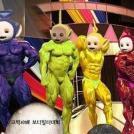
The Desolation of Art in the Late 20th and Early 21st Century
By
Azaeroe, in Entertainment
-
Recently Browsing 0 members
No registered users viewing this page.

By
Azaeroe, in Entertainment
No registered users viewing this page.